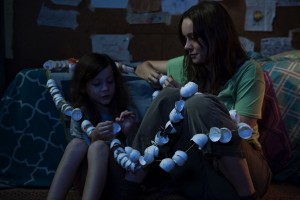By Christopher Sharrett.
Lenny Abrahamson’s Room, adapted from a recent novel by Emma Donoghue, is a “true crime” thriller of important resonance. Its story concerns a now-common and atrocious crime: a woman is kidnapped by a rapist and kept prisoner, a permanent sex slave. Joy Newsome (Brie Larson) is locked in a part of a garden shed for seven years by a man known to us as Old Nick (Sean Bridgers), the name connoting the devil. Two years into her captivity, she gives birth to a boy, Jack (Jacob Tremblay), who provides his mother emotional sustenance and adapts to his surroundings, treating the tiny space as a friend, anthropomorphizing and greeting each morning the sink, stove, toilet, a locker that functions as a wardrobe, and other bare-essential items. His mother educates him, so by his fifth birthday he is reading Alice’s Adventures in Wonderland. She also makes him exercise; he run back and forth in the small space and does child-level calisthenics. She is woman as ultimate nurturer, an amazingly sane one given her circumstances. Joy makes Jack go into the locker each evening when Old Nick returns to rape her. Eventually Jack becomes central to an escape plan that leads to Joy’s return with her son to her family and the arrest of Old Nick.
 The film can be approached as a thriller, and as a study in endurance, as a woman and her child live through impossible torment imposed by a psychopath. But to my mind this limits the film’s worth, and fails to note its political unconscious (or conscious statement?), which makes the tale less a comment on arcane pathology than a meditation on the role of woman in the patriarchal domestic household. The female is confined in the domestic prison, given particular rote duties, and forced to submit to the sex act that not only proscribes her pleasure but violates her body. For this, the male, who comes home at night frustrated by his lousy job, is the “provider,” seeing that the woman and her child have basic staples of life—he even buys Jack toys (it is notable that the electronic toy muscle car bought for him is very soon smashed by Jack). The man insults the woman in familiar style (“thinking was never your strong suit”). His attitude toward the woman is unremittingly condescending or outright abusive (the ultimate abuse aside), yet part of our quotidian reality. The film becomes a remark on woman and the household on the micro and macro levels.
The film can be approached as a thriller, and as a study in endurance, as a woman and her child live through impossible torment imposed by a psychopath. But to my mind this limits the film’s worth, and fails to note its political unconscious (or conscious statement?), which makes the tale less a comment on arcane pathology than a meditation on the role of woman in the patriarchal domestic household. The female is confined in the domestic prison, given particular rote duties, and forced to submit to the sex act that not only proscribes her pleasure but violates her body. For this, the male, who comes home at night frustrated by his lousy job, is the “provider,” seeing that the woman and her child have basic staples of life—he even buys Jack toys (it is notable that the electronic toy muscle car bought for him is very soon smashed by Jack). The man insults the woman in familiar style (“thinking was never your strong suit”). His attitude toward the woman is unremittingly condescending or outright abusive (the ultimate abuse aside), yet part of our quotidian reality. The film becomes a remark on woman and the household on the micro and macro levels.
After their escape, Jack is traumatized by the very concept of “outside” as he marvels at the vastness of the sky, the cityscape; his despairing mother has told him there is nothing else but Room. He and Joy are taken by police to the hospital while Old Nick is arrested. Joy is embraced by her divorced parents, Robert (William H. Macy) and Nancy (Joan Allen); the couple’s tension is palpable, increased by Robert’s refusal even to look at Jack. The presence of a rapist’s child is a violation of his privilege, since Jack is not part of Robert’s “line,” and a reminder that a male competitor has insulted his sexual authority. The return to the safety of home is filled with anxieties, including Robert’s ongoing resentment of Nancy for taking a new partner. The partner, Leo (Tom McCamus), is first seen in shadow at the end of a corridor; is Leo another Old Nick? Do men in general replicate the monster? The frightening moment quickly passes as Leo becomes a friend to Jack, trying in vain to calm the tension caused by the reunion of the family. The notion of divorce, new sexual partners accepted without jealousy, and the general acceptance of other human beings at face value are simply impossible. Although Leo helps out with food in an important scene and is kind to Jack, nourishment and nurturance are the typical duties of the female.
 The outside world, especially the media, worsen family tensions as Joy and her son become celebrities (an interviewer questions her devotion as a mother, her attempt to escape), causing Joy to slide into depression deeper than what we see during her captivity. that we never saw when she was confined to the Room. She is hospitalized and separated from Jack for the first time ever—they have slept in the same bed since Jack was born. The torment of mother and son become fodder for the “news cycle” and capitalist culture, which is imposed on Jack—by the family when he prefers to play with a tiny toy rather than the small mountain of gifts in the Newsome living room provided by well-wishers; even Joy is perplexed. While Joy seems the best of all mothers, even she cannot help but introduce Jack to patriarchal civilization. Since she could not cut Jack’s hair in the Room, she tells him the story of Samson, whose strength resided in his hair. The narrative about Samson in the Book of Judges introduces us, of course, to one of the central Fatal Women of myth and folklore, Delilah, whose betrayal of her lover is a kind of temporary castration, set right by nature and God’s intervention. But the film intervenes in the myth, if only mildly. Jack allows his grandmother to cut his long hair so that he can send his “strong” to his mother while she is hospitalized. The male therefore self-castrates in an act of sacrifice, although his bundled hair retains, at least in Jack’s mind, some fetish value (that he will perhaps one day forget?). Also, through much of the film Jack’s long hair erases his gender—no one is thinking of Samson when they mistake him for a little girl (the bystander who runs into Jack during the dangerous escape from Old Nick). The new short haircut thus introduces Jack fully to normality—he is now fully ready to enter male culture in its current formation.
The outside world, especially the media, worsen family tensions as Joy and her son become celebrities (an interviewer questions her devotion as a mother, her attempt to escape), causing Joy to slide into depression deeper than what we see during her captivity. that we never saw when she was confined to the Room. She is hospitalized and separated from Jack for the first time ever—they have slept in the same bed since Jack was born. The torment of mother and son become fodder for the “news cycle” and capitalist culture, which is imposed on Jack—by the family when he prefers to play with a tiny toy rather than the small mountain of gifts in the Newsome living room provided by well-wishers; even Joy is perplexed. While Joy seems the best of all mothers, even she cannot help but introduce Jack to patriarchal civilization. Since she could not cut Jack’s hair in the Room, she tells him the story of Samson, whose strength resided in his hair. The narrative about Samson in the Book of Judges introduces us, of course, to one of the central Fatal Women of myth and folklore, Delilah, whose betrayal of her lover is a kind of temporary castration, set right by nature and God’s intervention. But the film intervenes in the myth, if only mildly. Jack allows his grandmother to cut his long hair so that he can send his “strong” to his mother while she is hospitalized. The male therefore self-castrates in an act of sacrifice, although his bundled hair retains, at least in Jack’s mind, some fetish value (that he will perhaps one day forget?). Also, through much of the film Jack’s long hair erases his gender—no one is thinking of Samson when they mistake him for a little girl (the bystander who runs into Jack during the dangerous escape from Old Nick). The new short haircut thus introduces Jack fully to normality—he is now fully ready to enter male culture in its current formation.
In the final moments, Jack asks his mother if the can visit Room. There has been the sense in the film’s second half that Jack is uncomfortable in the world’s immensity and holds some nostalgia for the home of his first five years. With the aid of police, Jack and Joy revisit the shack that was their prison, which is about to be destroyed. Jack steps in and looks about, assessing, it seems, the tininess of the place and the cruelty of Old Nick. But one can read it as the need to revisit the site of trauma by way of removing it from one’s life. There is at least one more possible reading: no matter how terrible one’s parental home actually was, there can a yearning for its false security. Room is a modest but notable film, particularly for its portrayal of psychopathology and patriarchal civilization as subjects not confined to aberrant criminals, but to, as Freud would have it, everyday life.
Christopher Sharrett is Professor of Film Studies at Seton Hall University. He writes often for Film International. He is currently writing about the television series Breaking Bad.

